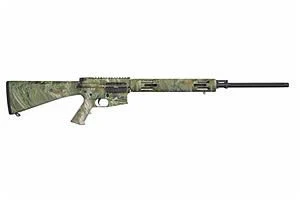Bushmaster Var24 ATACS vs TNW Technetwork PPSh-41
Put rifles head to head to compare caliber and more.
|
$828.89
|
vs |
$1.00
|
| Rifles | Bushmaster Var24 ATACS | TNW Technetwork PPSh-41 |
|---|---|---|
| Summary | ||
| Rating | ||
| Rank | ||
| Length | 42.25" | |
| Action | Semi-Automatic | |
| Caliber | .223 Remington | |
| Barrel Length | 24" Heavy Barrel | |
| Capacity | 5 | |
| Finish | Camo | |
| Gun Type | Rifle | |
| Details | ||
| Brand | Bushmaster | TNW Technetwork |
| Reviews | See 1 Review | N/A |
| Prices | ||
| MSRP | $816.89 | $1.00 |
| Used Price | $571.82 | $0.70 |
| Sale Price | $735.20 | $0.90 |
Rifles Descriptions
Bushmaster Var24 ATACS
Features a fluted 24 inch chrome-moly steel extra-heavy varmint barrel (one inch diameter out to gas block) and eleven degree competition muzzle crown. Coated bore and chamber. One in nine inch twist free-floated with a vented aluminum fore-end. Two-stage competition trigger (3.5 pound takeup, 1 pound letoff). Ships with manual and 5 round magazine. Covered in A-TACS camouflage finish.
TNW Technetwork PPSh-41
Semi-auto replica of famous Georgi Semenovich Shpagin rifle that defends StaligradA Brief History of the PPSh-41 (Pistolet-Pulemyot Shpagina-1941) During WWII, Russia found itself needing a rapid-fire Sub Machinegun (SMG) to counter the pitfalls of what is now known as urban warfare. The Russian leadership wanted a less expensive alternative to the Pistolet-Pulemyot Degtyaryova (PPD-40), which was a close copy of the German Bergman MP-18. Enter Georgi Semenovich Shpagin. Born in 1897 in the village of Klyuchnikovo to a peasant family, he was called into service around 1916 for the Russian Army and ultimately found his niche as an armorer in an infantry regiment. During the Soviet-Finnish War of 1939-40, the Finns had considerable battlefield advantage over Shpagin's Comrades due to their employment of an established machine gun. The Soviet High Command gave immediate order to find a weapon to counter and ultimately turn the tide for the Mother Land. In early 1940, Shpagin delivered a prototype that was easily manufactured and based on a readily available military cartridge - the Tokarov 7.62x25. After extensive testing the Shpagin prototype stomped the competition and in July of 1941 production began in the face of the rapidly advancing German Army.



